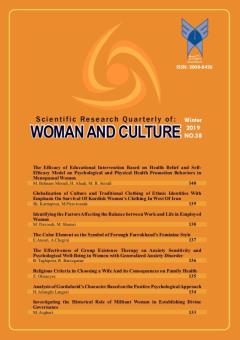The Color Element as the Symbol of Forough Farrokhzad’s Feminine Style
Subject Areas : Persian the literatureEqlima Ansari 1 , Ashraf Chegini 2
1 - Islamic Azad University Varamin – Pishva Branch, Department of Persian Language and Literature, Tehran, Iran.
2 - Islamic Azad University Varamin – Pishva Branch, Department of Persian Language and Literature, Tehran, Iran.
Keywords: Forough Farrokhzad, feminine style, color in Forough Farrokhzad’s poem, Color element,
Abstract :
The purpose of the present research was to study the role of color and its symbols in expressing feminine sentiments and emotions of Forough by using the new views of color psychology. The use of colors and feminine symbols were the means for Forough to communicate with her audience, expressing her feminine thoughts, speaking of a woman’s concerns and aspirations, and ultimately, defending her virtue as a woman. Regarding this element in her sentimental and feminine poetry contributed to a better understanding of her and, to a large degree, a decent connection of the audience with her feminine thoughts and feelings. This research was based on descriptive – analytical study, and according to the results obtained from the current study, red was at the highest frequency as the most vibrant color with a perfectly positive effect; after that black was considered as the heaviest color, which is the expression of the most feminine feelings in Forough’s poetry. Pink with the lowest frequency was used as an utterly feminine color; and other colors including white, green, silver, blue and gold, were roughly the same, reflecting the spirits, regrets, wishes, and chastity of this female poet.
- ال ملا، دروتی. (بیتا). روانشناسی رنگها. ترجمه : افسانه سلمانی(1393). قم : ولیعصر.
- استادی، محمدحسین. و ربیعی، آزیتا. (1393). زندگی شاد از نگاه رنگ درمانی. تهران : تحول.
- آندروز، تد .(1997). درمان بیماریها به وسیله رنگها. ترجمه قدیر گلکاریان. (1382). تهران : طلایه.
- آیزمن، لئاتریس. (2000). روانشناسی کاربردی رنگها(پنتون). ترجمه روحالله زمزمه. (1395). تهران : سیمرغ.
- خواجه پور، میلاد. و سمندی، ساناز. و عبداللهی، فاطمه. و تابش، سمانه. (1391). رنگ روانشناسی زندگی. تهران : سبزان.
- ساتن، تینا. و ام.ولان، برید. (2004). هارمونی رنگ. ترجمه مریم مدنی. (1389). تهران : مارلیک.
- سان، هوارد. و سان، دوروتی. (1992). زندگی با رنگ. ترجمه نغمه صفاریان پور. (1378). تهران : حکایت.
- سرور یعقوبی، علی. (1388). رنگ و حسآمیزی در شعر معاصر. مطالعات نقد ادبی. 14، 106 – 124.
- شعبانی، لیلا. (1393). نگاهی جامعه شناختی بر اشعار فروغ فرخزاد. تهران : بهمن برنا.
- شفیعی کدکنی، محمدرضا. (1372). صور خیال در شعر فارسی. تهران : آگاه.
- شمیسا، سیروس.(1388). نقد ادبی. تهران : میترا.
- عباسی، بتول (1382). به آفتاب سلامی دوباره خواهم داد. تهران : علم.
- علوی مقدم، مهیار. و پورشهرام، سوسن. (1389). کاربرد نظریه روان شناسی رنگ ماکس لوشر در نقد و تحلیل شعر فروغ فرخزاد. پژوهشهای زبان و ادبیات فارسی. 2، 83 – 94.
- فانی اسکی، راضیه. (1396). ﺯﯾﺒﺎﺷﻨﺎﺳﯽ ﺭﻧﮓ ﺩﺭ ﺩﻭ ﻣﺠﻤﻮﻋﻪ ﺷﻌﺮ ﻓﺮﻭﻍ ﻓﺮﺧﺰﺍﺩ (ﺍﺳﯿﺮ، ﺍﯾﻤﺎﻥ ﺑﯿﺎﻭﺭﯾﻢ ﺑﻪ ﺁﻏﺎﺭ ﻓﺼﻞ ﺳﺮﺩ). ﻫﻤﺎﯾﺶ ﻣﻠﯽ ﭘﮋﻭﻫﺶ ﻫﺎﯼ ﺷﻌﺮ ﻣﻌﺎﺻﺮ ﻓﺎﺭﺳﯽ.
- فرخزاد، فروغ. (1389). دیوان کامل. تهران : عدالت گستر.
- فرخزاد، فروغ. (1383)، مجموعهی سرودهها. تهران : شادان.
- فلسفی، احمد. (1391). اسرار روانشناسی رنگها. تهران : فرا روانشناسی.
- لامبرت، مری. (2002). رنگها برای زندگی بهتر. ترجمه نیکو اعلاباف.(1394). تهران : نسل نواندیش.
- لوشر، ماکس. (1972). روانشناسی رنگها. ترجمه لیلا مهردادپی. (1393). تهران : حسام.
- مشرف آزاد تهرانی. محمود. (1376). پریشادخت شعر. تهران : ثالث.
- هانری، کربن. (1980). واقع انگاری رنگها و علم میزان. ترجمه انشاالله رحمتی(1390). تهران : سوفیا.
_||_

